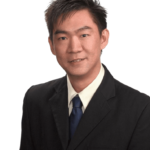Introduction:
Singapore’s education system is renowned globally for its excellence, and the foundation of this success lies in its primary school education. The primary education system in Singapore plays a pivotal role in shaping the academic, social, and character development of young learners. This article provides a general overview of primary schools in Singapore, shedding light on the unique features of Special Assistance Plan (SAP) and Gifted Education Programme (GEP) schools. The admission /balloting process will also discussed in this article.
Primary education in Singapore is compulsory for six years for all Singaporean citizens born after January 1st, 1996. The Ministry of Education (MOE) oversees the curriculum, which emphasizes a holistic approach integrating academic subjects like English, Mathematics, Science, Mother Tongue Languages (MTL), and social studies with character development, critical thinking, and creativity.
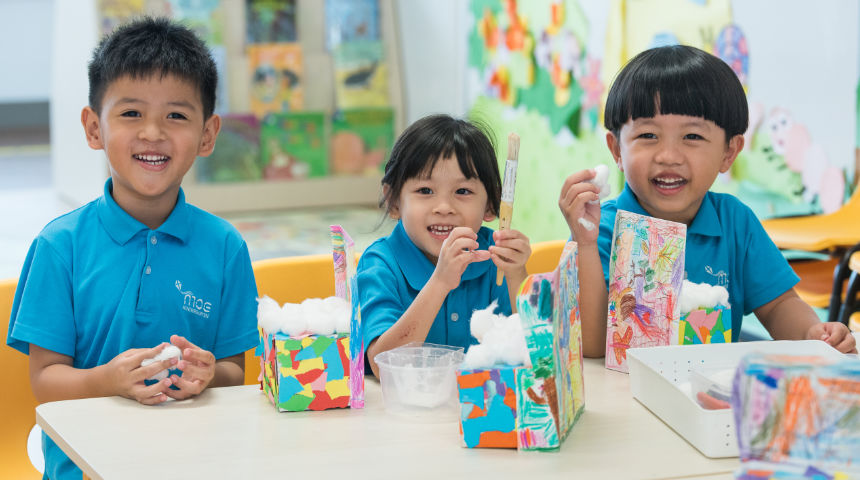
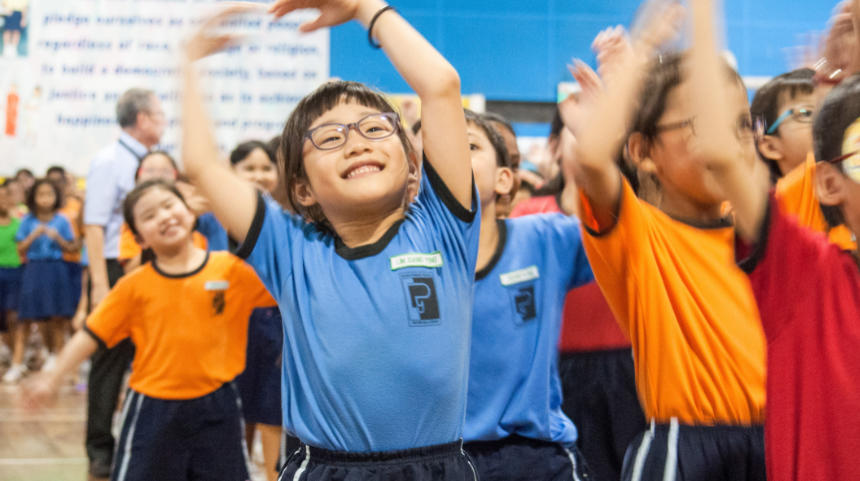
General Overview of Primary Schools:
Primary education in Singapore typically spans six years, starting from Primary 1 to Primary 6, catering to children aged 7 to 12. The curriculum is designed to provide a strong foundation in languages, mathematics, science, and social studies. In addition to academic subjects, emphasis is placed on character education, values inculcation, and the development of soft skills.
Primary education is divided into two cycles – Foundation Stage (Primary 1 to Primary 3) and Practice Stage (Primary 4 to Primary 6). The Foundation Stage focuses on building a strong academic and social foundation, while the Practice Stage involves a more in-depth study of subjects in preparation for the Primary School Leaving Examination (PSLE).
Types of Schools:
The primary school landscape comprises several types of schools:
- Government schools: These offer the national curriculum at subsidized fees.
- Government-aided schools: Similar to government schools but receive some financial aid from religious organizations or other entities.
- Independent schools: These are private schools with their own curriculum and fees.
Special Assistance Plan (SAP) Schools:
SAP schools are a distinctive feature of Singapore’s primary education landscape. These schools offer a bilingual education in English and Mandarin, aiming to preserve and promote the Chinese language and culture. The SAP was introduced in 1979, and it currently encompasses a select group of secondary schools, junior colleges, and primary schools.
In SAP primary schools, the curriculum is enriched with a stronger emphasis on the Chinese language, literature, and culture. Students are immersed in an environment that fosters bilingual proficiency, helping them develop a deep appreciation for both English and Mandarin. The SAP program not only enhances linguistic skills but also instills cultural awareness and understanding.
There are 15 SAP schools, namely:
- Ai Tong School – 100 Bright Hill Dr, Singapore 579646
- Catholic High School – 9 Bishan Street 22, Singapore 579767
- CHIJ St. Nicholas Girls’ School – Ang Mo Kio Street 13, Singapore 569405
- Holy Innocents’ Primary School – 5 Lor Low Koon, Singapore 536451
- Hong Wen School – 30 Towner Rd, Singapore 327829
- Kong Hwa School – 350 Guillemard Rd, Singapore 399772
- Maha Bodhi School – 10 Ubi Ave 1, Singapore 408931
- Maris Stella High School (Primary) – 80 Bartley Rd, Singapore 539786
- Nan Hua Primary School – 30 Jln Lempeng, Singapore 128806
- Nanyang Primary School – 52 King’s Rd, Singapore 268097
- Pei Chun Public School – 16 Lor 7 Toa Payoh, Singapore 319320
- Pei Hwa Presbyterian Primary School – 7 Pei Wah Ave, Singapore 597610
- Poi Ching School – 21 Tampines Street 71, Singapore 529067
- Red Swastika School – 350 Bedok North Ave 3, Singapore 469719
- Tao Nan School – 49 Marine Cres, Singapore 449761
Gifted Education Programme (GEP) Schools:
The Gifted Education Programme (GEP) caters to students who demonstrate exceptional intellectual abilities. GEP schools provide an accelerated and enriched curriculum to challenge and stimulate the intellectual development of gifted students. The program was introduced in 1984 to nurture the talents of the academically advanced and creative learners.
GEP primary schools identify and admit students through a rigorous selection process, typically conducted in Primary 3. The curriculum in GEP schools goes beyond the standard primary education syllabus, offering advanced topics in mathematics, science, language arts, and critical thinking. GEP students engage in a more challenging learning environment, fostering a spirit of inquiry and independent thinking.
There are total 9 GEP Schools:
- Anglo-Chinese School (Primary) – 50 Barker Rd, Singapore 309918 // moving to Tengah and become a co-ed by 2030
- Catholic High School (Primary) – 9 Bishan Street 22, Singapore 579767
- Henry Park Primary School – 1 Holland Grove Rd, Singapore 278790
- Nan Hua Primary School – 30 Jln Lempeng, Singapore 128806
- Nanyang Primary School – 52 King’s Rd, Singapore 268097
- Raffles Girls’ Primary School – 21 Hillcrest Rd, Singapore 289072
- Rosyth School – 21 Serangoon North Ave 4, Singapore 555855
- St. Hilda’s Primary School – 2 Tampines Ave 3, Singapore 529706
- Tao Nan School – 49 Marine Cres, Singapore 449761
Please take note that Anglo-Chinese School (Primary) at Barker Rd will move to Tengah and become a co-ed school from 2030, the Ministry of Education announced on 9-Feb-2023.
Here’s a table summarizing the key differences between SAP and GEP schools:
| Feature | SAP Schools | GEP Schools |
|---|---|---|
| Focus | Mother Tongue Language (MTL) | Academically gifted students |
| Curriculum | National curriculum with emphasis on MTL | Differentiated curriculum with deeper and broader exploration |
| Selection process | Based on geographical location | Rigorous selection test |
| Language of instruction | English and MTL | English |
Choosing the Right School:
The choice between a SAP, GEP, or mainstream school depends on individual needs and aspirations. Parents should consider their child’s strengths, interests, learning style, and desired language proficiency when making this important decision.
Exploring the MOE website, “https://www.moe.gov.sg/“, and attending school open houses can provide valuable information and help navigate this crucial step in a child’s educational journey.
Here are five key factors to consider when making this important choice:
1. Matching Passions with Programs:
Does your child have a budding interest in music, sports, or art? Consider schools offering programs that nurture these talents and provide opportunities for your child to explore their passions.
2. Finding the Right Location:
Think about the school’s location and the commute involved. Aim for a school that minimizes travel time, allowing your child more rest and energy for after-school activities or focused engagement in schoolwork.
3. Embracing Cultural Identity:
For children with a strong cultural heritage, consider schools with robust Mother Tongue Language programs. This fosters deeper cultural connections and strengthens linguistic skills, providing a valuable foundation for their development.
4. Understanding the School Environment:
Explore the school’s culture and environment through visits, open houses, and interactions with teachers and staff. This allows you to understand if their values and learning style align with your child’s needs and your family’s values.
5. Addressing Special Needs:
If your child has any special educational needs, ensure the chosen school offers the necessary support structures and programs to ensure their academic success and well-being. Additionally, consider using the Ministry of Education’s (MOE) SchoolFinder tool to gain further insights into various schools and their offerings.
By carefully considering these factors, you can make an informed decision and choose the ideal primary school that will provide your child with the foundation for a successful and fulfilling learning journey.
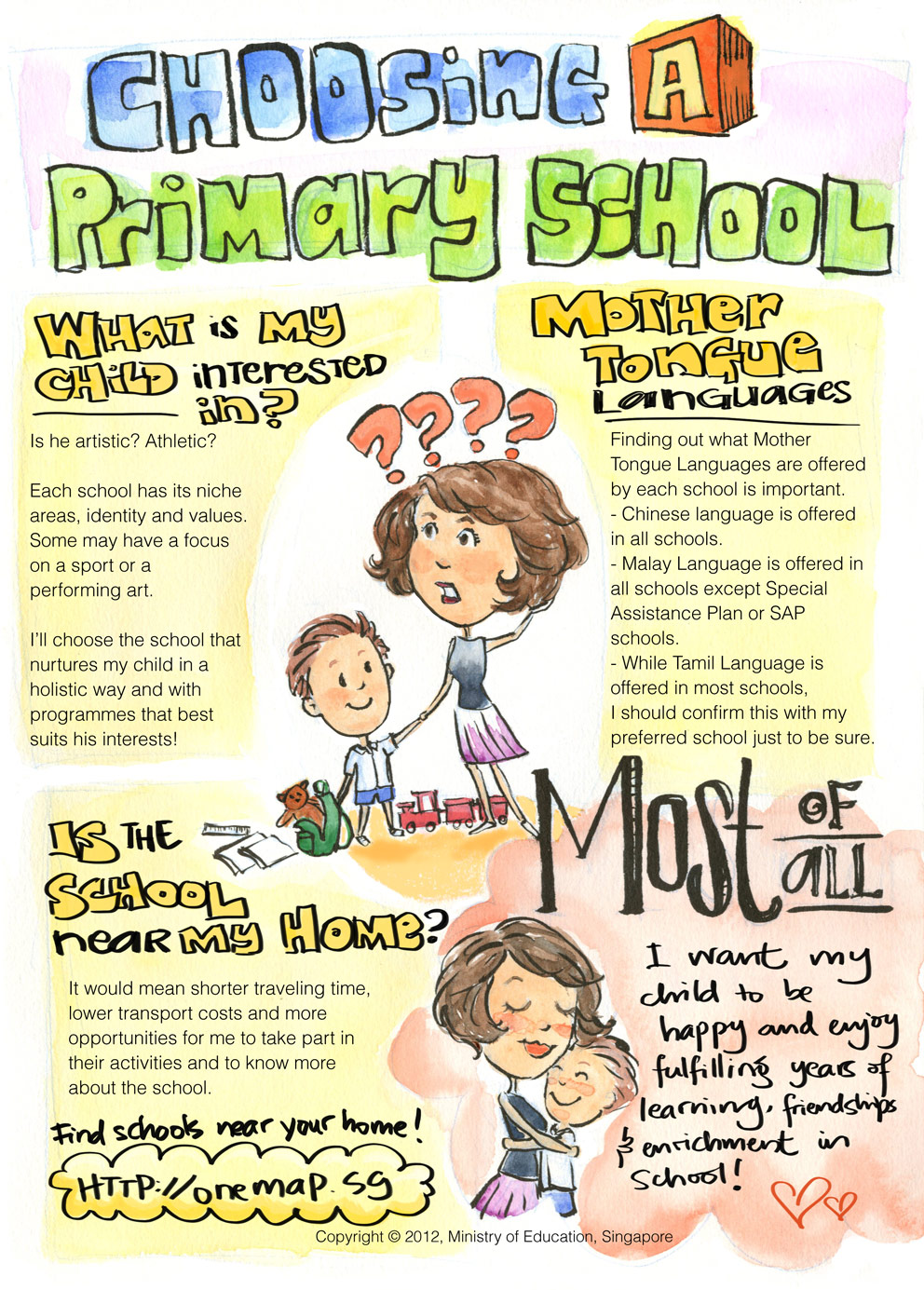
School Admission Process
Primary school education starts the year the child turns 7, but applications begin half a year before. You can start registering the year your child turns 6. If your child is born on 1st January you can also register them with the previous batch. You key in the date of birth of your child into the eligibility checker on MOE’s website to know when to register.
After 2020, P1 registration became a fully online process. Now, all you need to do is pop out your laptop and log into the P1 registration portal with your Singpass account. Only one parent is required to register.
The registration process is split into 5 main phases – 1, 2A, 2B, 2C, 2C Supplementary. At each phase, you can only apply for 1 school. The window period for each phase is usually lasts less than 2 days so don’t leave the decision making to the final hour.
Phases:
- Phase 1 (Sibling Priority): Children with siblings already studying in the desired school have priority.
- Phase 2A (Alumni Priority): Children of alumni and those with close connections to the school qualify here.
- Phase 2B (Volunteer Priority): Parents who volunteered at least 40 hours in the school qualify.
- Phase 2C (1-2km): Open to all SCs living within 1-2 km of the school.
- Phase 2C Supplementary (Outside 2km): Open to any remaining SC/PR applicants.
- Phase 3 (International Students): Applies to international students seeking entry.
Upon the completion of the Primary 1 registration process, you will receive notifications about your child’s placement via SMS. Following this, you will need to submit miscellaneous forms, including immunization records, and expect to receive emails guiding you on the necessary preparations for the first day of school.
The subsequent steps involve attending an orientation day at the chosen school. During this session, you can finalize arrangements such as school bus services, purchase school supplies like uniforms and textbooks, and address any remaining administrative details. The academic year typically begins on the Monday of the first week of January.
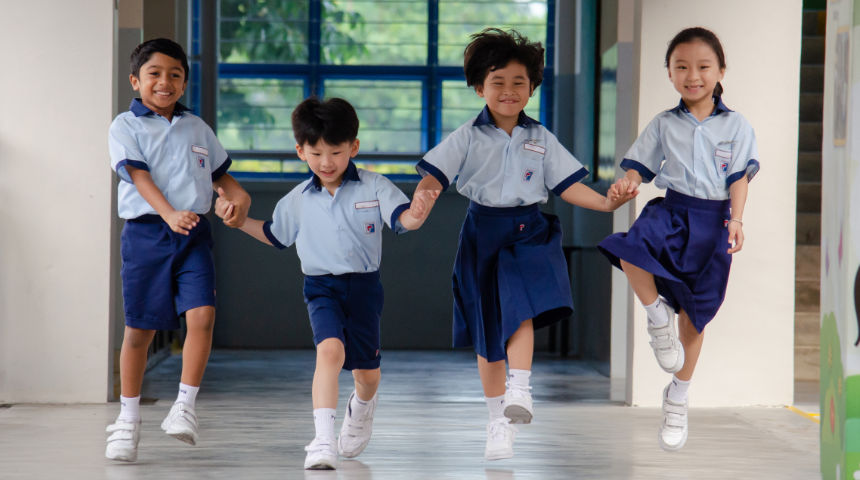
P1 Application Tips
Priority admission is allocated in the following order during the balloting process:
- Singapore Citizens living <1km of the school
- Singapore Citizens living between 1km-2km from the school
- Singapore Citizens living >2km of the school
- Permanent Residents living <1km of the school
- Permanent Residents living between 1km-2km of the school
- Permanent Residents living >2km of the school
You can find out which schools are within 2km of your address on the MOE website.
On top of that, to make the Primary 1 application process smoother, here are some tips from experienced parents who have navigated the system:
-
Consider Balloting Data:
- Review balloting data from previous years available on the Ministry of Education’s website. This can help you identify schools with better admission odds, potentially making the selection process more manageable.
- Review balloting data from previous years available on the Ministry of Education’s website. This can help you identify schools with better admission odds, potentially making the selection process more manageable.
-
Prioritize Getting Your First Child In:
- Focus on securing admission for your first child. Some parents choose to volunteer at the school, while others consider relocating for priority admission. However, it’s crucial to note that slots are not guaranteed. Once your first child is admitted, the subsequent admission process for siblings becomes more secure.
- Focus on securing admission for your first child. Some parents choose to volunteer at the school, while others consider relocating for priority admission. However, it’s crucial to note that slots are not guaranteed. Once your first child is admitted, the subsequent admission process for siblings becomes more secure.
-
Explore Open Houses:
- Attend open houses at various primary schools to gain insights into each school’s culture. Take the opportunity to speak with students and parent volunteers during your visits, as they may provide unofficial tips that can aid in decision-making.
Embarking on the Primary 1 registration journey can be intimidating for first-time parents, but with careful consideration, strategic planning, and insights from experienced individuals, the process becomes more manageable and less overwhelming.
Popularity of Schools Based on Phase 2B
Our understanding of popular schools is drawn from the Phase 2B registration data provided by the Ministry of Education (MOE). The popularity score is determined by the ratio of Phase 2B applicants to available vacancies.
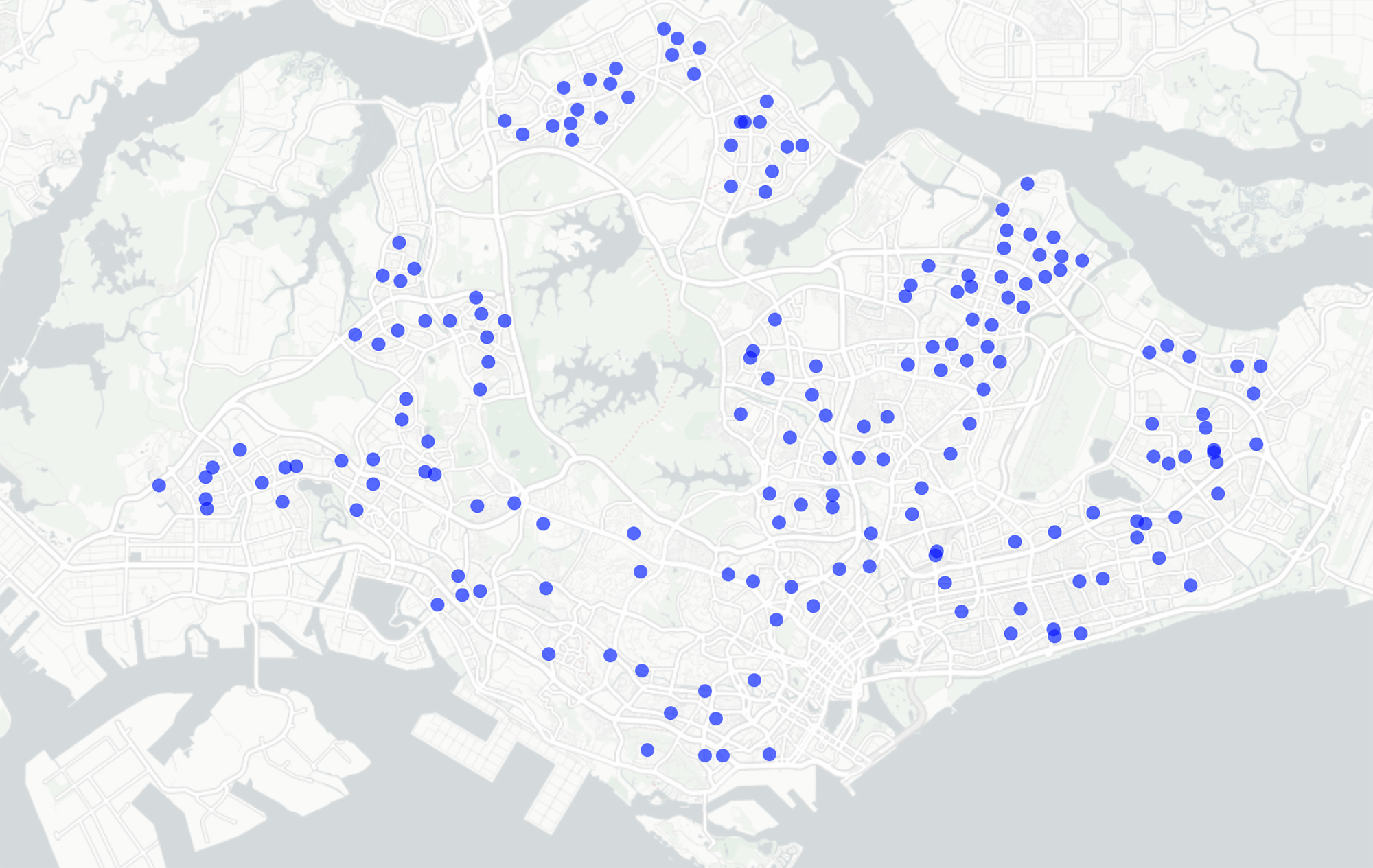
| School Name | Phase 2B Total Vacancies | Phase 2B Total Applicants | Popularity (Applicants/ Vacancies |
|---|---|---|---|
| Methodist Girls’ School (Primary) | 20 | 79 | 3.95 |
| Tao Nan School – SAP & GEP | 23 | 61 | 2.65 |
| Ai Tong School – SAP | 20 | 48 | 2.4 |
| Holy Innocents’ Primary School – SAP | 21 | 50 | 2.38 |
| CHIJ St. Nicholas Girls’ School – SAP | 20 | 46 | 2.3 |
| Admiralty Primary School | 22 | 49 | 2.23 |
| St. Joseph’s Institution Junior | 38 | 84 | 2.21 |
| Catholic High School – SAP & GEP | 20 | 43 | 2.15 |
| Anglo-Chinese School (Junior) | 27 | 57 | 2.11 |
| Chongfu School | 25 | 51 | 2.04 |
| Kong Hwa School – SAP | 32 | 65 | 2.03 |
| St. Hilda’s Primary School – GEP | 20 | 40 | 2 |
| Anglo-Chinese School (Primary) – GEP | 28 | 55 | 1.96 |
| Nan Chiau Primary School | 41 | 79 | 1.93 |
| Nan Hua Primary School – SAP & GEP | 20 | 38 | 1.9 |
| Nanyang Primary School – SAP & GEP | 20 | 37 | 1.85 |
| Pei Hwa Presbyterian Primary School – SAP | 20 | 37 | 1.85 |
| Kuo Chuan Presbyterian Primary School | 31 | 54 | 1.74 |
| Rulang Primary School | 20 | 34 | 1.7 |
| Singapore Chinese Girls’ Primary School | 20 | 34 | 1.7 |
| Maris Stella High School – SAP | 27 | 45 | 1.67 |
| Fairfield Methodist School (Primary) | 20 | 33 | 1.65 |
| South View Primary School | 20 | 30 | 1.5 |
| CHIJ Primary (Toa Payoh) | 27 | 40 | 1.48 |
| Henry Park Primary School – GEP | 21 | 29 | 1.38 |
| Pei Chun Public School – SAP | 20 | 27 | 1.35 |
| Xinmin Primary School | 24 | 32 | 1.33 |
| Red Swastika School – SAP | 20 | 26 | 1.3 |
| St. Anthony’s Primary School | 32 | 39 | 1.22 |
| Rosyth School – GEP | 20 | 24 | 1.2 |
| Paya Lebar Methodist Girls’ School (Primary) | 41 | 47 | 1.15 |
| Northland Primary School | 20 | 22 | 1.1 |
| Pasir Ris Primary School | 21 | 22 | 1.05 |
| Mee Toh School | 50 | 50 | 1 |
| Radin Mas Primary School | 20 | 20 | 1 |
| CHIJ Our Lady Of The Nativity | 54 | 53 | 0.98 |
| Horizon Primary School | 20 | 19 | 0.95 |
| Raffles Girls’ Primary School – GEP | 43 | 39 | 0.91 |
| Sengkang Green Primary School | 23 | 21 | 0.91 |
| Maha Bodhi School – SAP | 37 | 33 | 0.89 |
| St. Andrew’s Junior School | 37 | 31 | 0.84 |
| Keming Primary School | 24 | 19 | 0.79 |
| Chua Chu Kang Primary School | 32 | 25 | 0.78 |
| River Valley Primary School | 26 | 20 | 0.77 |
| Anderson Primary School | 28 | 21 | 0.75 |
| Gongshang Primary School | 20 | 15 | 0.75 |
| Hong Wen School – SAP | 36 | 27 | 0.75 |
| Bukit Panjang Primary School | 29 | 21 | 0.72 |
| St. Gabriel’s Primary School | 34 | 24 | 0.71 |
| Frontier Primary School | 20 | 14 | 0.7 |
| CHIJ Our Lady Of Good Counsel | 32 | 20 | 0.63 |
| Poi Ching School – SAP | 43 | 27 | 0.63 |
| Canossa Catholic Primary School | 27 | 16 | 0.59 |
| Hougang Primary School | 32 | 18 | 0.56 |
| Westwood Primary School | 20 | 11 | 0.55 |
| Qifa Primary School | 44 | 22 | 0.5 |
| Temasek Primary School | 20 | 10 | 0.5 |
| Yu Neng Primary School | 20 | 10 | 0.5 |
| St. Margaret’s School (Primary) | 40 | 19 | 0.48 |
| Tanjong Katong Primary School | 30 | 14 | 0.47 |
| Canberra Primary School | 43 | 19 | 0.44 |
| Innova Primary School | 33 | 14 | 0.42 |
| Woodlands Primary School | 31 | 13 | 0.42 |
| Yangzheng Primary School | 22 | 9 | 0.41 |
| White Sands Primary School | 35 | 14 | 0.4 |
| Compassvale Primary School | 44 | 17 | 0.39 |
| Montfort Junior School | 38 | 15 | 0.39 |
| Rivervale Primary School | 31 | 12 | 0.39 |
| CHIJ (Katong) Primary | 43 | 16 | 0.37 |
| Shuqun Primary School | 30 | 11 | 0.37 |
| St. Stephen’s School | 62 | 23 | 0.37 |
| CHIJ (Kellock) | 46 | 16 | 0.35 |
| Chongzheng Primary School | 20 | 7 | 0.35 |
| CHIJ Our Lady Queen Of Peace | 46 | 12 | 0.26 |
| De La Salle School | 48 | 12 | 0.25 |
| Princess Elizabeth Primary School | 20 | 5 | 0.25 |
| Punggol Primary School | 28 | 6 | 0.21 |
| Punggol Green Primary School | 20 | 4 | 0.2 |
| Wellington Primary School | 20 | 4 | 0.2 |
| Woodgrove Primary School | 25 | 5 | 0.2 |
| Marymount Convent School | 67 | 13 | 0.19 |
| Jurong West Primary School | 27 | 4 | 0.15 |
| Teck Ghee Primary School | 41 | 6 | 0.15 |
| West Grove Primary School | 52 | 8 | 0.15 |
| Alexandra Primary School | 39 | 4 | 0.1 |
| Ngee Ann Primary School | 42 | 4 | 0.1 |
| Riverside Primary School | 20 | 2 | 0.1 |
| Geylang Methodist School (Primary) | 44 | 4 | 0.09 |
| Qihua Primary School | 54 | 5 | 0.09 |
| St. Anthony’s Canossian Primary School | 67 | 6 | 0.09 |
| Concord Primary School | 39 | 3 | 0.08 |
| Fern Green Primary School | 25 | 2 | 0.08 |
| Kheng Cheng School | 48 | 4 | 0.08 |
| Elias Park Primary School | 30 | 2 | 0.07 |
| Tampines Primary School | 28 | 2 | 0.07 |
| Telok Kurau Primary School | 28 | 2 | 0.07 |
| Townsville Primary School | 43 | 3 | 0.07 |
| Endeavour Primary School | 52 | 3 | 0.06 |
| Huamin Primary School | 32 | 2 | 0.06 |
| Valour Primary School | 33 | 2 | 0.06 |
| Fengshan Primary School | 25 | 1 | 0.04 |
| Jiemin Primary School | 28 | 1 | 0.04 |
| Jing Shan Primary School | 24 | 1 | 0.04 |
| Waterway Primary School | 28 | 1 | 0.04 |
| Fernvale Primary School | 38 | 1 | 0.03 |
| Naval Base Primary School | 35 | 1 | 0.03 |
| Opera Estate Primary School | 36 | 1 | 0.03 |
| Park View Primary School | 36 | 1 | 0.03 |
| Punggol Cove Primary School | 31 | 1 | 0.03 |
| Sembawang Primary School | 35 | 1 | 0.03 |
| Xishan Primary School | 37 | 1 | 0.03 |
| Zhangde Primary School | 31 | 1 | 0.03 |
| Zhonghua Primary School | 39 | 1 | 0.03 |
| Bukit Timah Primary School | 42 | 1 | 0.02 |
| Corporation Primary School | 51 | 1 | 0.02 |
| Farrer Park Primary School | 42 | 1 | 0.02 |
| Fuchun Primary School | 49 | 1 | 0.02 |
| Greenwood Primary School | 46 | 1 | 0.02 |
| Haig Girls’ School | 43 | 1 | 0.02 |
| Northshore Primary School | 59 | 1 | 0.02 |
| Palm View Primary School | 46 | 1 | 0.02 |
| Xingnan Primary School | 63 | 1 | 0.02 |
| Yew Tee Primary School | 46 | 1 | 0.02 |
| Lianhua Primary School | 79 | 1 | 0.01 |
| Ahmad Ibrahim Primary School | 43 | 0 | 0 |
| Anchor Green Primary School | 40 | 0 | 0 |
| Ang Mo Kio Primary School | 50 | 0 | 0 |
| Angsana Primary School | 67 | 0 | 0 |
| Beacon Primary School | 45 | 0 | 0 |
| Bedok Green Primary School | 51 | 0 | 0 |
| Bendemeer Primary School | 44 | 0 | 0 |
| Blangah Rise Primary School | 32 | 0 | 0 |
| Boon Lay Garden Primary School | 75 | 0 | 0 |
| Bukit View Primary School | 77 | 0 | 0 |
| Cantonment Primary School | 45 | 0 | 0 |
| Casuarina Primary School | 28 | 0 | 0 |
| Cedar Primary School | 62 | 0 | 0 |
| Changkat Primary School | 48 | 0 | 0 |
| Clementi Primary School | 60 | 0 | 0 |
| Damai Primary School | 59 | 0 | 0 |
| Dazhong Primary School | 24 | 0 | 0 |
| East Spring Primary School | 38 | 0 | 0 |
| Edgefield Primary School | 46 | 0 | 0 |
| Evergreen Primary School | 42 | 0 | 0 |
| First Toa Payoh Primary School | 42 | 0 | 0 |
| Fuhua Primary School | 27 | 0 | 0 |
| Gan Eng Seng Primary School | 37 | 0 | 0 |
| Greendale Primary School | 44 | 0 | 0 |
| Greenridge Primary School | 39 | 0 | 0 |
| Junyuan Primary School | 37 | 0 | 0 |
| Jurong Primary School | 26 | 0 | 0 |
| Kranji Primary School | 33 | 0 | 0 |
| Lakeside Primary School | 38 | 0 | 0 |
| Marsiling Primary School | 46 | 0 | 0 |
| Mayflower Primary School | 38 | 0 | 0 |
| Meridian Primary School | 35 | 0 | 0 |
| New Town Primary School | 58 | 0 | 0 |
| North Spring Primary School | 46 | 0 | 0 |
| North View Primary School | 48 | 0 | 0 |
| North Vista Primary School | 39 | 0 | 0 |
| Northoaks Primary School | 62 | 0 | 0 |
| Oasis Primary School | 20 | 0 | 0 |
| Pei Tong Primary School | 58 | 0 | 0 |
| Peiying Primary School | 36 | 0 | 0 |
| Punggol View Primary School | 20 | 0 | 0 |
| Queenstown Primary School | 40 | 0 | 0 |
| Seng Kang Primary School | 49 | 0 | 0 |
| Si Ling Primary School | 32 | 0 | 0 |
| Springdale Primary School | 29 | 0 | 0 |
| Tampines North Primary School | 49 | 0 | 0 |
| Teck Whye Primary School | 57 | 0 | 0 |
| Unity Primary School | 41 | 0 | 0 |
| West Spring Primary School | 20 | 0 | 0 |
| West View Primary School | 28 | 0 | 0 |
| Woodlands Ring Primary School | 47 | 0 | 0 |
| Xinghua Primary School | 77 | 0 | 0 |
| Yio Chu Kang Primary School | 47 | 0 | 0 |
| Yishun Primary School | 33 | 0 | 0 |
| Yuhua Primary School | 50 | 0 | 0 |
| Yumin Primary School | 36 | 0 | 0 |
| Zhenghua Primary School | 30 | 0 | 0 |
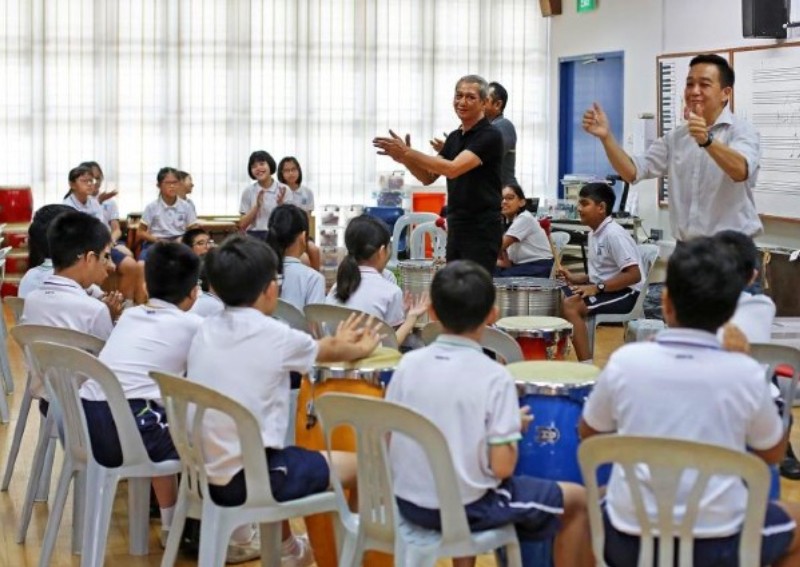
Conclusion:
The Gifted Education Programme (GEP) caters to students who demonstrate exceptional intellectual abilities. GEP schools provide an accelerated and enriched curriculum to challenge and stimulate the intellectual development of gifted students. The program was introduced in 1984 to nurture the talents of the academically advanced and creative learners.
GEP primary schools identify and admit students through a rigorous selection process, typically conducted in Primary 3. The curriculum in GEP schools goes beyond the standard primary education syllabus, offering advanced topics in mathematics, science, language arts, and critical thinking. GEP students engage in a more challenging learning environment, fostering a spirit of inquiry and independent thinking.
